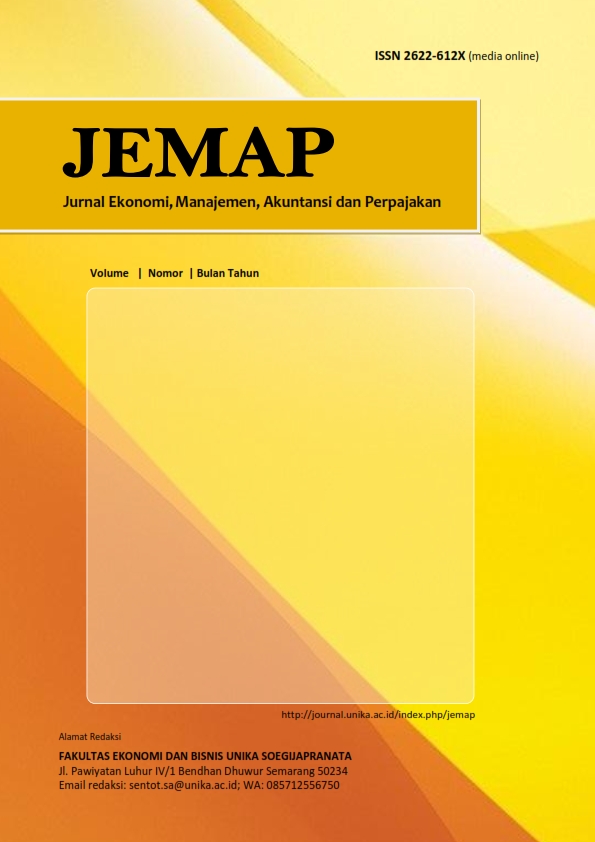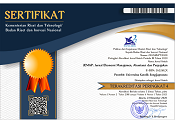Mediasi Impulsivitas Dalam Pengaruh Keterampilan, Literasi Keuangan Digital Dan Otonomi Terhadap Kesejahteraan Keuangan
Abstract
Keywords
Full Text:
PDF (Bahasa Indonesia)References
Agyei, W., Moyo, M., & Asongu, S. A. (2021). Financial inclusion and digital literacy in Sub-Saharan Africa: The role of mobile phones. Information Development, 37(4), 517-532.
Cheung, M. W., et al. (2022). Financial Autonomy and Its Implications for Well-Being. Journal of Financial Counseling and Planning.
Deci, E. L., & Ryan, R. M. (2017). Self-Determination Theory: Basic Psychological Needs in Motivation, Development, and Wellness. Guilford Press.
Fernandes, D., et al. (2020). Digital Skills and Financial Management in the Digital Age. Financial Planning Review.
Fernandes, D., Lynch, J. G., & Netemeyer, R. G. (2022). Financial literacy, financial education, and downstream financial behaviors. Management Science, 68(3), 1510-1529.
Garcia, F. E., Aluja, A., & Barrio, V. (2020). Impulsivity and its influence on financial decision-making. Journal of Economic Psychology, 77, 102-118.
Goyal, K., & Kumar, S. (2021). Financial planning and well-being: Evidence from India. International Journal of Bank Marketing, 39(3), 381-399
Grohmann, A., Kouwenberg, R., & Menkhoff, L. (2019). Financial literacy and retirement planning: New evidence from emerging economies. Journal of Banking & Finance, 107, 103625.
Hamilton, K. R., et al. (2023). "Impulsivity and its implications for behavior: A comprehensive review." Psychological Review, 130(3), 456-473.
Hadar, L., Sood, S., & Fox, C. R. (2020). Subjective knowledge in consumer financial decision-making. Journal of Marketing Research, 57(1), 38-54
Hasler, A., & Lusardi, A. (2022). Digital Financial Literacy: Opportunities and Challenges. Journal of Financial Literacy.
Herbert, S., et al. (2021). Impulsivity and Financial Decision-Making: A Behavioral Perspective. Journal of Behavioral Finance.
Kim, J., Kwon, J., & Anderson, E. A. (2020). "Factors Affecting Financial Well-Being." Journal of Financial Counseling and Planning.
Lusardi, A., & Mitchell, O. S. (2018). "The Economic Importance of Financial Literacy." Journal of Economic Literature.
Lusardi, A., & Mitchell, O. S. (2020). Financial Literacy and the Path to Financial Resilience. National Bureau of Economic Research.
Lusardi, A., & Mitchell, O. S. (2021). Financial literacy and planning: Implications for retirement wellbeing. Journal of Pension Economics & Finance, 20(1), 1-20.
Nanda, S., & Banerjee, R. (2020). Financial self-efficacy and financial behavior: A study among Indian millennials. International Journal of Consumer Studies, 44(6), 574-586
Netemeyer, R. G., Warmath, D., Fernandes, D., & Lynch, J. G. (2018). "How Am I Doing? Financial Self-Efficacy and Its Role in Financial Behavior." Journal of Consumer Research.
Puri, M., & Robinson, D. T. (2020). Mindfulness and Financial Decision-Making. Management Science.
Reynolds, B., & Marquinez, L. (2020). "The neural basis of impulsivity: Advances in neuroscience." Journal of Behavioral Sciences, 45(2), 123-134.
Roberts, W., et al. (2022). "Cognitive and emotional underpinnings of impulsivity: Insights from recent research." Journal of Psychology and Neuroscience, 29(4), 234-250.
Sebastian, A., et al. (2021). "Neurobiological correlates of impulsive decision-making." Neuroscience Today, 40(1), 56-72.
Shim, S., Serido, J., & Tang, C. (2022). Financial capability and well-being in young adulthood. Journal of Consumer Affairs, 56(3), 1234-1255.
Strömbäck, C., Lind, T., Skagerlund, K., Västfjäll, D., & Tinghög, G. (2021). Does self-control predict financial behavior and financial well-being? Journal of Behavioral and Experimental Economics, 90, 101658.
Xiao, J. J., Chen, C., & Sun, L. (2019). Age differences in consumer financial capability. Journal of Financial Counseling and Planning, 30(2), 229-240.
Xiao, J. J., & O'Neill, B. (2021). Financial Capability and Well-Being. International Journal of Consumer Studies.
Xiao, J. J., & Porto, N. (2019). "Financial Education and Financial Satisfaction." International Journal of Consumer Studies.
Xie, Y., Zhang, C., & Fu, J. (2020). The impact of digital financial literacy on financial behavior: Evidence from China. Journal of Financial Services Marketing, 25(3), 186-198.
DOI: https://doi.org/10.24167/jemap.v8i1.11335
Refbacks
- There are currently no refbacks.
e-ISSN 2622-612X | View My Stats







